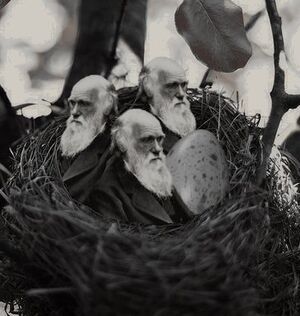UnNews:Darwin's egg found in museum
| A newsstand that's brimming with issues | ✪ | UnNews | ✪ | Tuesday, February 3, 2026, 17:51:59 (UTC) |
| Darwin's egg found in museum | 
|
17 April 2009
CAMBRIDGE, UK -- A retired volunteer worker at the ancient university's Zoology Museum has told of her surprise and delight after she discovered that one of the specimens in the faculty's collection of eggs from around the world was a Darwin's egg. Liz Moisten has been working at the museum for a decade, where she sorts through the enormous number of eggs donated to the collection by generations of students who bring them back from field trips to far-flung lands. "It was an exhilarating experience. After working on the egg collections for 10 years this was a tremendous thing to happen, and the best thing about it is it was discovered by me, an uneducated oik, so town has scored a rare victory over gown," she said, referring to the long-standing animosity between Cambridge residents and the university which is seen by many as wielding too much power over everyday life.
Darwins, which once inhabited Britain where they were commonly hunted for food and for the resplendent, beautiful white plumage which hung below their beaks, are thought to have been extinct in their natural environments since 1880. The last example in captivity, known as Charles, died in 1882 at Down House Zoo in Kent. Animal husbandry experts at the world-famous educational establishment's School of the Biological Sciences are now closely examining the egg to see if there is any chance it might remain viable. "Eggs do not usually retain a state in which it is possible for a live animal to hatch for any great length of time," explains Dr. Rupert Roderick, the department's egg and ornithological expert, "but this egg has been preserved at the museum in a refrigerated storage room at -40 Celsius. As such, we believe there is a very slight chance that it may be possible to hatch a live Darwin from it. Failing that, the egg will be handed over to our genetics department who may be able to extract sufficient DNA from it to clone a Darwin from it, much as they did when they recreated dinosaurs for John Hammond's Isla Nubar prehistoric wildlife park project. The Darwin was a spectacular animal and it would be a happy day for all of us if we could bring them back from extinction. It would be a great shame were we to miss the opportunity to give everybody a chance of seeing a live one."
Professor Tarquin Penderley-Knowle, director of the museum, was at first dismissive of the find. "It has long been thought that there are no Darwin eggs in existence," he stated. "When Mrs. Moisten came to me saying she thought she'd found one in our own collection, it seemed just too good to be true and so I maintained disbelief for that reason alone, not because I thought someone without an academic background would be incapable of achieving such a feat and accurately identifying such an object."
"Yeah, he says that now, the wiley old goat," Mrs. Moisten countered when told of Prof. Penderley-Knowle's comments, "but at the time he was all "Pooh-pooh, what's this commoner doing in my office, what does she know anything about anything?" He might know an egg from his elbow, but I bet he couldn't make an omlette. I went to the university of life, and this just shows that nothing counts like experience, if you ask me." She was rambling on in a similar vein an hour later, at which point your UnNews reporter, who had been surreptitiously listening to his iPod for some time by this point, left the building without Mrs. Moisten noticing.
Sources[edit]
- Christine McGourty "Charles Darwin's egg rediscovered". BBC, April 10, 2009
